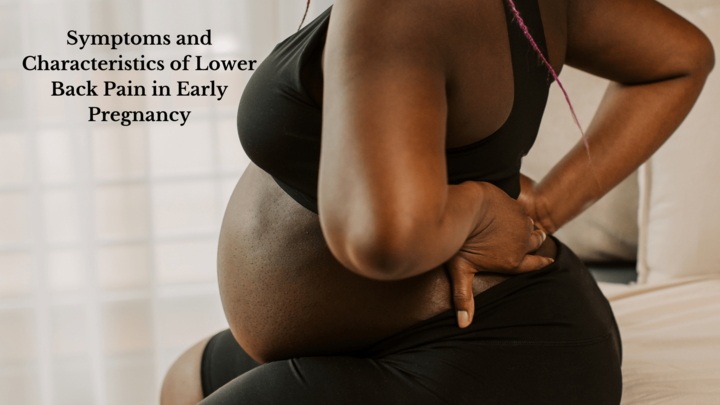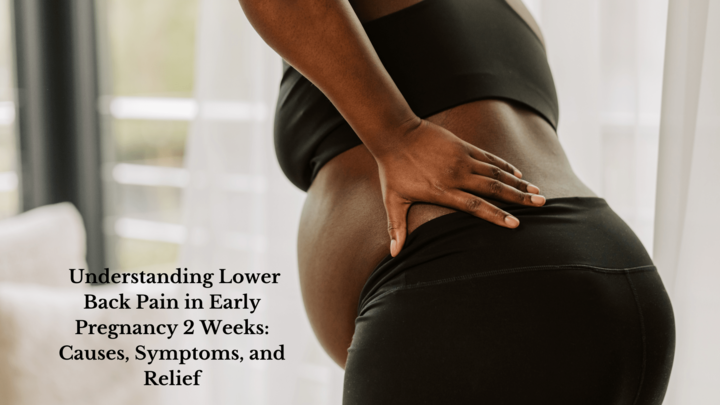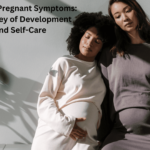Pregnancy is a remarkable journey that brings about significant changes in a woman’s body. Along with the joy and anticipation of welcoming a new life, expecting mothers may also experience various discomforts. One common issue that arises during early pregnancy is lower back pain. In this article, we will delve into the causes, symptoms, and potential relief options for lower back pain during the initial stages of pregnancy.
I. Lower Back Pain as an Early Pregnancy Sign
One of the frequently asked questions by women is whether lower back pain can occur as early as two weeks into pregnancy. While every woman’s experience may vary, it is possible for some expectant mothers to start feeling mild lower back pain during the early weeks. This is primarily due to the hormonal changes taking place in the body. The surge in hormones, particularly progesterone, can lead to the relaxation of ligaments and joints, including those in the lower back area, causing discomfort.
Apart from hormonal changes, the uterus begins to expand, exerting pressure on the surrounding structures, which can contribute to back pain. However, it is important to note that lower back pain alone should not be considered a definitive indicator of pregnancy. Confirming pregnancy through a reliable test is crucial to rule out other potential causes of back pain.
II. Symptoms and Characteristics of Lower Back Pain in Early Pregnancy

Lower back pain experienced during early pregnancy can differ from regular back pain in several ways. For starters, the pain is typically characterized by a dull, achy sensation rather than sharp or acute pain. Expectant mothers often describe it as a constant discomfort that may worsen with certain movements or prolonged periods of sitting or standing.
The location of the pain is another differentiating factor. Pregnancy-related back pain tends to concentrate in the lower back area, often radiating to the buttocks and thighs. In contrast, non-pregnancy related back pain may affect various areas of the back and may be linked to specific injuries or conditions.
III. Pregnancy Tests and Lower Back Pain
If you experience lower back pain and suspect that you might be pregnant, taking a pregnancy test is the next logical step. Home pregnancy tests are widely available and can provide accurate results within a few minutes. However, to achieve the most reliable outcome, it is advisable to take the test after a missed period or follow the instructions provided on the test kit.
If the pregnancy test confirms your suspicion, it is essential to consult with a healthcare professional for proper prenatal care and guidance. Early prenatal care is crucial for monitoring the health of both the mother and the developing fetus and addressing any potential issues that may arise.
IV. Treatment Options for Lower Back Pain in Early Pregnancy
Pregnant women should always seek medical advice before starting any treatment for back pain. Self-medication, especially during pregnancy, can be risky, as certain medications may pose a threat to the developing baby.
That being said, there are safe and effective treatment options that can help alleviate lower back pain during early pregnancy. Some of these include:
- Gentle Exercises and Stretches: Engaging in low-impact exercises, such as walking, swimming, or prenatal yoga, can help strengthen the back and abdominal muscles, providing better support to the spine.
- Correct Posture: Maintaining proper posture throughout the day, especially when sitting or standing, can reduce strain on the lower back.
- Heat and Cold Therapy: Applying a heating pad or taking warm baths can help relax tense muscles, while cold packs can reduce inflammation and numb the area temporarily.
- Support Devices: Pregnancy support belts or pillows can provide added comfort and help reduce pressure on the lower back during sleep or daily activities.
V. Best Ways to Relieve Lower Back Pain During Pregnancy
In addition to the treatments mentioned above, there are several self-care measures that pregnant women can adopt to manage and relieve lower back pain:
- Rest: Getting enough rest is essential for a pregnant woman’s overall well-being, including managing back pain. Avoiding strenuous activities and taking short breaks throughout the day can help reduce discomfort.
- Proper Lifting Techniques: When lifting objects, bend your knees and use your leg muscles instead of your back to avoid strain.
- Massage Therapy: Gentle massages can provide relief by easing muscle tension and improving blood circulation.
- Acupuncture: Some pregnant women find acupuncture to be helpful in alleviating back pain. However, consult with a qualified acupuncturist experienced in treating pregnant women.
VI. Precautions and Safety Measures

While it is common for some women to experience mild back pain during early pregnancy, severe or persistent pain should never be ignored. It could be a sign of an underlying issue that requires medical attention. If the pain is accompanied by other symptoms such as vaginal bleeding, fever, or intense abdominal pain, seek immediate medical assistance.
Additionally, pregnant women should avoid high-impact sports and activities that may increase the risk of injury. Maintaining a balanced diet, staying hydrated, and attending regular prenatal check-ups are vital for a healthy pregnancy.
Conclusion
Lower back pain during early pregnancy can be a discomforting experience, but with proper understanding and care, it can be effectively managed. Remember that every pregnancy is unique, and what works for one person may not work for another. If you are pregnant and experiencing back pain, it is crucial to consult with a healthcare professional for personalized advice and guidance. By prioritizing self-care, proper posture, and safe treatment options, expectant mothers can focus on enjoying the journey to motherhood with minimal discomfort and the best possible health outcomes for both themselves and their babies.
Share this post: on Twitter on Facebook on Google+


